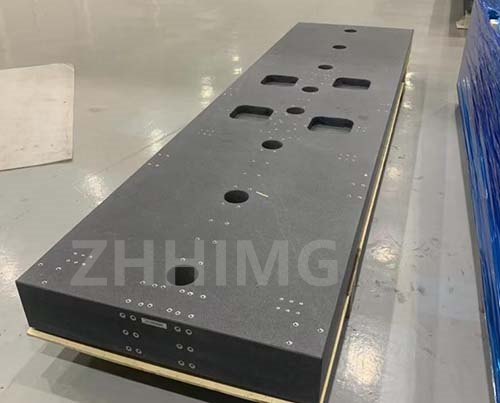Granite components are widely used in semiconductor equipment due to their high stability and durability. They are responsible for maintaining the precision and accuracy of semiconductor manufacturing processes. However, the effectiveness and reliability of granite components depend on the standards and specifications that are upheld during their design, fabrication, and installation.
The following are some of the standards and specifications that must be adhered to when using granite components in semiconductor equipment:
1. Material Density: The density of the granite material used in the manufacturing of granite components should be around 2.65g/cm3. This is the density of the natural granite material, and it ensures consistency and reliability in the granite components' properties.
2. Flatness: Flatness is one of the most crucial specifications for granite components used in semiconductor equipment. The flatness of the granite surface should be below 0.001 mm/m2. This ensures that the component's surface is flat and level, which is essential for semiconductor manufacturing processes.
3. Surface Finish: The surface finish of granite components should be of high quality, with a surface roughness below 0.4µm. This ensures that the surface of the granite component has a low coefficient of friction, which is critical for the smooth operation of semiconductor equipment.
4. Thermal Expansion Coefficient: Semiconductor equipment operates at different temperatures, and granite components should be able to withstand thermal fluctuations without deformation. The thermal expansion coefficient of granite used in semiconductor equipment should be below 2 x 10^-6 /°C.
5. Dimensional Tolerance: Dimensional tolerance is crucial for granite components' performance. The dimensional tolerance of granite components should be within ±0.1mm for all critical dimensions.
6. Hardness and Wear Resistance: Hardness and wear resistance are essential specifications for granite components used in semiconductor equipment. Granite has a hardness of Mohs Scale 6-7, making it a suitable material for use in semiconductor equipment applications.
7. Insulation Performance: Granite components used in semiconductor equipment should have excellent insulation performance to prevent damage to sensitive electronic components. Electrical resistance should be above 10^9 Ω/cm.
8. Chemical Resistance: Granite components should be resistant to common chemicals used in semiconductor manufacturing processes, such as acids and alkalis.
In conclusion, the standards and specifications for granite components used in semiconductor equipment are crucial to ensure the longevity and reliability of both the components and the equipment they are used in. The above guidelines should be strictly adhered to during the design, fabrication, and installation processes to ensure that the components are of the highest quality. By following these standards and specifications, semiconductor manufacturers can ensure that their equipment's performance remains optimal, leading to increased productivity and profitability.
Post time: Mar-20-2024

